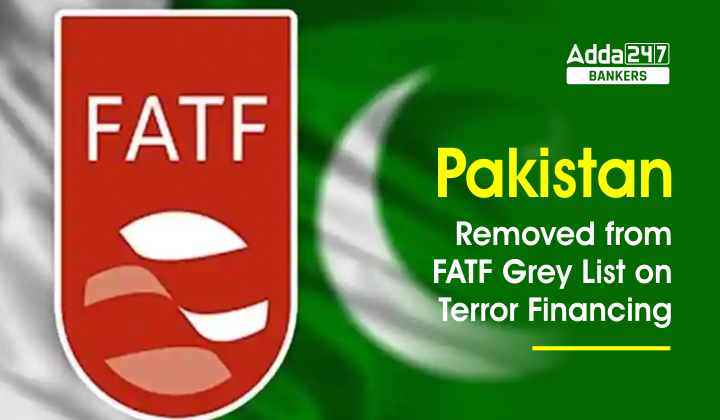Pakistan removed from FATF grey list on terror financing: After four years, the Financial Action Task Force has removed Pakistan from the grey list of the international watchdog on the financing of terrorism and money laundering. This is a setback for India, which has insisted that Pakistan must take verifiable and irreversible steps to combat terrorism.
FATF removed Pakistan from grey list: Key Points
- Since 2018, Pakistan has been on the Financial Action Task Force’s (FATF) “grey list” due to strategic counter-terrorist financing-related inadequacies. Pakistan failed to comply with FATF recommendations in the areas of risk assessment, national cooperation, targeted sanctions, preventative measures, due diligence, internal and third-party controls, law enforcement, regulation, and supervision for money laundering and terror financing.
- Following the country’s inclusion on the grey list in 2018, FATF assigned Pakistan a 27-point action agenda, which was later expanded to 34 points, relating to money laundering, terrorist financing, and action against armed organisations and individuals.
- Recently, the Paris-based FATF removed Pakistan from a list of countries subject to greater scrutiny, popularly known as the “grey list.”
- According to the FATF, Pakistan was removed from the “grey list” as a result of Islamabad’s “high-level political commitment” to combating money laundering and reforming its existing monitoring structure.
- Pakistan will continue to work with the Asia Pacific Group on Money Laundering (APG) to strengthen its anti-money laundering (AML) and counter-terrorism financing (CFT) systems.
What is Financial Action Task Force?
- The FATF is an intergovernmental organisation that establishes international standards in order to prevent international financial crimes that support terrorism.
- The G-7 Summit in Paris formed the FATF in July 1989 with the original goal of investigating and developing solutions to combat money laundering.
- Following the 9/11 attacks, the FATF expanded its scope to include initiatives to stop the financing of terrorism and to stop the financing of the spread of weapons of mass destruction.
- Its Secretariat is based at the headquarters of the Organization for Economic Cooperation and Development (OECD) in Paris.
- The decision-making body of the FATF is the FATF Plenary. It meets three times a year.
- The FATF has created the FATF Standards, often known as FATF Recommendations, which guarantee a coordinated international response to stop terrorism, organised crime, and corruption.
- The FATF currently has 37 member states and two regional organisations (European Commission and Gulf Cooperation Council) that represent the majority of significant financial centres throughout the world.
- Since 2010, India has been a member of the FATF. India is also a member of the Asia Pacific Group (APG) and the Eurasian Group (EAG).
What is FATF’s grey list?
- The FATF grey list includes countries that are considered safe havens for terrorist funding and money laundering. This inclusion aims to alert the country that it may be added to the blacklist. Countries like Philippines, South Sudan, Syria, Turkey, Yemen, Uganda, and Myanmar are under FATF grey list
- Grey listing denotes that FATF has strengthened monitoring of a nation to assess its effectiveness in combating money laundering and terrorism funding.
- Another name for the “grey list” is the “increased monitoring list.”
What is FATF’s Black list?
- The blacklist includes nations categorised as Non-Cooperative Countries or Territories (NCCTs).
- These nations aid in the financing of terrorism and the laundering of money. The FATF regularly updates the blacklist, adding or removing entries.
- The Democratic People’s Republic of Korea (DPRK) and Iran are currently on the High-Risk Jurisdiction or Black List.




 Daily Current Affairs 3rd July 2025, Imp...
Daily Current Affairs 3rd July 2025, Imp...
 Daily Current Affairs 2nd July 2025, Imp...
Daily Current Affairs 2nd July 2025, Imp...
 The Hindu Review June 2025, Download Mon...
The Hindu Review June 2025, Download Mon...


